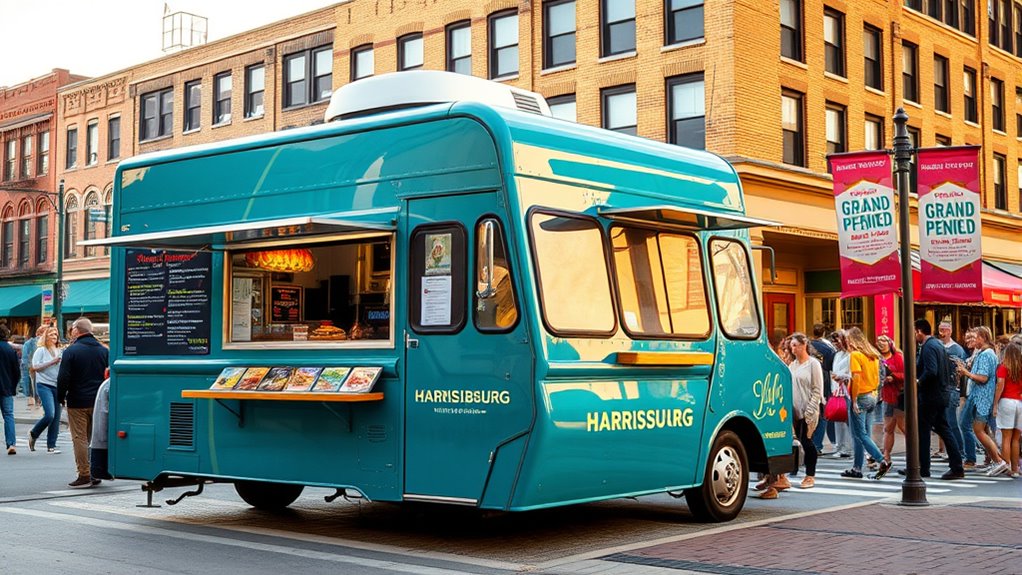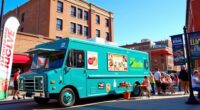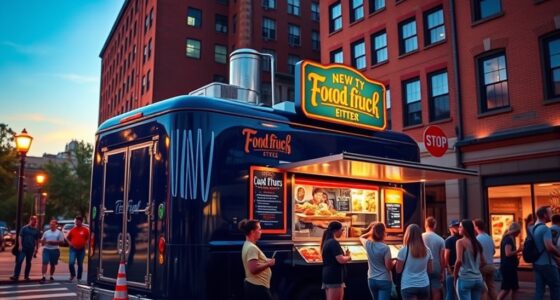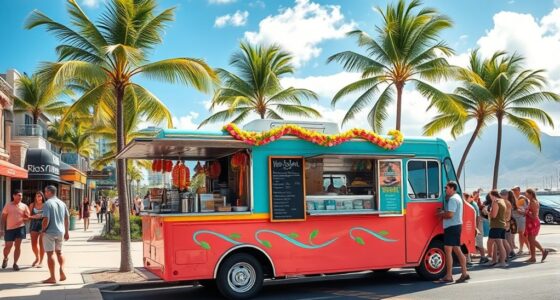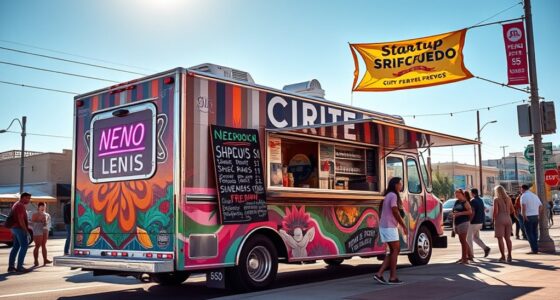To open a food truck in Harrisburg, you need to secure permits from the Department of Building and Housing, including health department food handler permits, costing around $100 to $250. Budget for startup costs between $70,000 and $150,000, and choose busy locations like festivals, downtown, or parks. Develop a menu focused on local tastes and use social media to boost visibility. Keep exploring to learn more about making your food truck business a success.
Key Takeaways
- Obtain necessary permits from Harrisburg’s Department of Building and Housing, including vendor, health, and event-specific licenses, with applications submitted 60 days prior.
- Startup costs range from $70,000 to over $150,000, covering truck purchase, equipment, inventory, and licensing fees.
- Target high-traffic locations like Riverfront Park, downtown, and during festivals such as the Pennsylvania Farm Show for maximum exposure.
- Develop a menu featuring affordable, locally sourced, and dietary-restricted options tailored to local tastes and preferences.
- Utilize social media, community events, and customer loyalty programs to boost visibility, engagement, and repeat business.
Navigating Permits and Licensing in Harrisburg
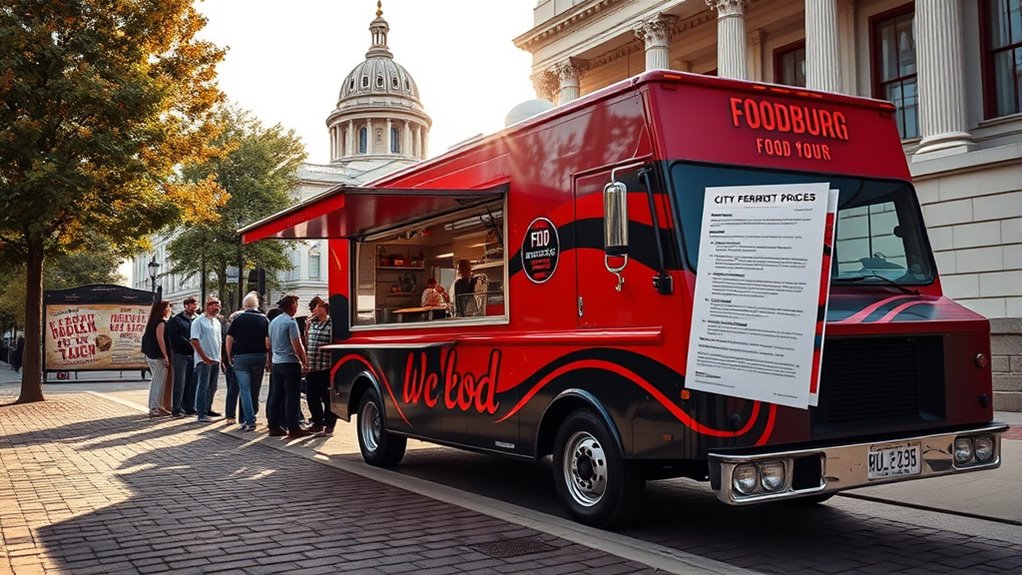
Finding your way through permits and licensing in Harrisburg requires mobile food vendors to follow a series of specific steps to operate legally. First, you need a Vendor Permit from the Department of Building and Housing Development, which involves submitting business registration documents, federal tax IDs, and proof of liability insurance meeting city minimums—often $1,000,000. Health and safety licenses are also mandatory: you’ll need health department food handler permits, inspection certificates, and a detailed plan review, including site plans and photos of your vending unit. Submit your application at least 60 days before you plan to start selling. Licenses are valid for one year, must be visibly displayed, and are non-transferable. Local city licenses, like the Mercantile and Festival Health Licenses, are also required for specific events or locations. Additionally, the city’s licensing department provides resources and guidance to help vendors comply with all regulations and avoid common pitfalls. It is also advisable to familiarize yourself with the health and safety requirements to ensure full compliance with city standards.
Understanding Costs and Budgeting for Your Food Truck

Understanding the costs involved in starting and maintaining a food truck in Harrisburg is essential for creating a realistic budget and ensuring your business’s long-term success. Startup expenses typically range from $70,000 to over $150,000, depending on whether you buy new or used and how much customization you need. Used trucks without equipment usually cost $35,000 to $60,000, with equipment adding around $45,000. Initial inventory runs about $2,000 to $3,000, plus minor costs for serveware. Licensing fees in Pennsylvania range from $103 to $241, with annual renewal around $82. Operating costs, including fuel, maintenance, and insurance, can total $1,500 to $2,500 monthly. Budgeting for marketing, staff, and supplies will also be vital to sustain and grow your food truck business. Proper planning and detailed budgeting can help avoid unexpected expenses and ensure business profitability.
Prime Locations and Events to Maximize Visibility

Choosing the right locations and events can substantially boost your food truck’s visibility and sales in Harrisburg. High-traffic spots like Riverfront Park during festivals, such as the July 4th Food Truck Festival, attract thousands, offering prime exposure. Proximity to the State Capitol and downtown office areas draws lunchtime crowds, increasing midday sales. Near recreation areas along the Susquehanna River, you can target families and event-goers on weekends and evenings. Large annual events like the Pennsylvania Farm Show and outdoor shows provide concentrated crowds wanting quick, mobile food options. Partnering with corporate parks, universities, and community events, including farmers markets and neighborhood festivals, expands your reach. Using the Best Food Trucks map and mobile app, positioning strategically at these hotspots ensures consistent foot traffic, maximizing your visibility and sales potential throughout Harrisburg. Additionally, leveraging predictive modeling in educational data mining can help identify upcoming popular venues and times based on historical attendance data, enabling more targeted marketing efforts.
Crafting a Menu That Appeals to Local Tastes

To create a menu that truly resonates with Harrisburg’s diverse community, you need to contemplate local food preferences, economic realities, and cultural influences. Many residents face food insecurity, so affordability and nutrition are key. Focus on familiar comfort foods like sandwiches, BBQ, and ethnic street foods, which appeal to local tastes. Incorporate fresh, seasonal, and locally sourced ingredients to meet demand for farm-to-table quality. Offer options for dietary restrictions, such as gluten-free or vegetarian dishes, to broaden your reach. Keep flavor profiles moderate, with traditional seasonings and mild spice, avoiding overly exotic ingredients. Harrisburg has a high participation rate in government assistance programs, which influences local food preferences and affordability considerations. By balancing cost, local flavor, and dietary needs, your menu can attract both budget-conscious and food-loving customers, fostering loyalty and community connection.
Effective Marketing Strategies for Food Truck Success

Effective marketing is essential for turning your Harrisburg food truck into a neighborhood staple. You should leverage social media platforms like Facebook, Instagram, TikTok, and Snapchat to boost visibility. Regular posts and targeted campaigns can increase sales by around 20%, with engaged customers spending 15% more. Participating in local events and festivals helps you connect directly with diverse audiences and build repeat business, while also offering cost-effective advertising. Implement customer loyalty programs—digital or physical—to encourage repeat visits and gather valuable feedback. Use GPS tracking and mobile apps to help customers find you easily and optimize routes. Additionally, data analytics can reveal customer preferences and purchasing patterns, allowing you to tailor your marketing efforts more effectively, thereby increasing your ROI. Finally, harness data analytics to identify peak times, popular items, and customer preferences, increasing your marketing ROI and ensuring sustained success in Harrisburg.
Frequently Asked Questions
How Long Does the Entire Food Truck Permit Process Typically Take?
The permit process typically takes 2 to 6 weeks from application submission to approval. You should plan for delays if your application is incomplete or if inspections uncover issues. Submitting early, ideally 30 to 60 days before you plan to start, helps. Keep in mind, peak seasons may cause longer wait times, so starting the process well in advance guarantees you stay on schedule and avoid unnecessary setbacks.
Are There Specific Restrictions on Operating Hours for Food Trucks in Harrisburg?
Your query about Harrisburg’s food truck hours is like steering an open road without a GPS. Luckily, the city’s rules are more like a map without strict time boundaries—they focus on licensing, location, and safety, not set hours. Usually, your hours are dictated by event schedules or private agreements. So, you have the flexibility to operate within those contexts, making your food truck journey smooth and adaptable.
Can I Operate My Food Truck on Private Property Without City Permits?
You can’t operate your food truck on private property without city permits in Harrisburg. Even on private land, you need zoning approval, a mobile food facility license, and health inspections. You must also get written permission from the property owner and verify your operation complies with distance restrictions and safety rules. Skipping permits can lead to fines or shutdowns, so it’s essential to follow all licensing and zoning requirements.
What Are the Most Common Reasons for Permit or License Denial?
Think of permit approval like crossing a busy street—you need to follow all the signals. The most common reasons for denial include incomplete or false applications, missing documentation, and failing to meet health or safety standards. Operating in disallowed areas, violating vehicle or location rules, or having prior violations can also block your permit. Ensuring you meet all legal requirements and provide accurate info helps clear the way for your food truck adventure.
Are There Special Permits Required for Alcohol Service From Food Trucks?
You can’t serve alcohol directly from your food truck in Harrisburg without special permits. Pennsylvania law restricts alcohol sales to fixed, licensed locations. However, you can participate in events with Special Occasion Permits or collaborate with licensed establishments. These permits allow alcohol service within specific areas and times, but you must apply in advance and follow strict guidelines. Always check local regulations to guarantee you’re compliant before planning alcohol-related activities.
Conclusion
By maneuvering permits smoothly, budgeting wisely, choosing prime locations, crafting appealing menus, and marketing effectively, you’re setting yourself up for success. You’ll attract eager customers, build a loyal following, and turn your food truck into a thriving venture. Embrace each step with confidence, stay adaptable, and keep your passion at the forefront. With dedication and smart planning, you’ll transform your Harrisburg food truck dream into a delicious reality.
